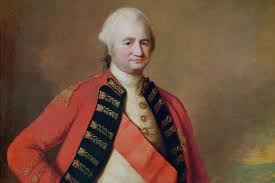On 29 September 1725, Robert Clive, the man who had a huge role in laying the foundations of British rule in India was born in Shropshire, England. This article will give brief details about Robert Clive within the context of the IAS Exam.
| Aspirants who choose History as an optional subject for the UPSC Mains may refer to the UPSC History Syllabus, page to get a general idea of the subject at hand!!
In addition, the following links will also be of immense help:
|
Background of Robert Clive
- Robert Clive was born to Richard and Rebecca Clive. His father was a lawyer. The family had a moderate income.
- Clive had 12 younger siblings. As a child, he was prone to fighting and was described as a trouble-maker in school.
- In 1744, Clive’s father secured him a position as a ‘factor’ in the East India Company formed on December 31st, 1600 and he sailed for Bombay. In June 1744, Clive reached Fort St. George near Chennai.
- He worked as a bookkeeper for two years. Clive is said to have developed into a great reader here at the Governor’s library.

Robert Clive’s Tenure in India
- Clive was able to distinguish himself in the First and Second Carnatic Wars in South India.
- During the First Carnatic War, the French attacked and captured Madras. The British residents in Madras were forced to promise that they would not fight against the French. A few British residents including Clive refused and so were kept under guard. However, Clive managed to escape along with a few others disguised as natives. They went to Fort St. David in Cuddalore where Clive helped in its defence against a French attack.
- He also showed his military brilliance in the Siege of Pondicherry.
- Clive also impressed his superiors in the Siege of Arcot (1751) during the Second Carnatic War. Arcot was the capital of the Nawab of the Carnatic. Chanda Sahib, the Nawab had left his capital to Trichy in order to besiege Muhammad Ali, his rival, who was stationed at the Trichy Fort.
- Chanda Sahib was an ally of the French. In order to curb the French influence in the region, the British were supporting Muhammad Ali. Robert Clive decided to attack Chanda Sahib’s capital Arcot as a divisionary tactic. This move proved to be brilliant and the British were successful in installing their ally Muhammad Ali as the Carnatic’s Nawab.
- Clive won praises for this siege including an appreciation from the then British Prime Minister.
- He left India for England in 1753 only to return in 1755. He was made the deputy governor of Fort St. David. He was also a lieutenant colonel in the British Army.
- He also played an important role in the recapture of Calcutta from the Nawab of Bengal Siraj Ud Daulah after the Black Hole Incident in 1757.
- His next major role was in the Battle of Plassey in June 1757. Even though the British troops were heavily outnumbered by the forces of the Nawab, he was easily defeated because of defections and betrayal by his own men. Clive had managed to bribe his way to victory. Siraj was dethroned and Mir Jafar was installed by the British as the new Nawab. Jafar had been Siraj’s chief commander and had betrayed his own master.
- This battle led to a British puppet being installed as the ruler of Bengal. This established British supremacy in Bengal. Clive was made the Governor of the Presidency of Fort William in 1757.
- In 1760, Clive returned to England an extremely rich man.
- His third and final stint in India began with his arrival in Bengal in 1765. He was now Lord Clive and the Governor-General of Bengal. By this time, the Diwani of Bengal, Bihar and Orissa was won by the British after the Battle of Buxar.
- Clive now established the Dual System of Government which led to huge exploitation of Indian merchants who were rendered penniless. The British also extorted huge amounts of money as taxes from farmers who were reduced to absolute poverty.
- He is called ‘Clive of India’ and was also made 1st Baron Clive. He left India for good in 1767.
- Robert Clive died on 22 November 1774 aged 49. He either killed himself or died of an opium overdose.
Birth of Robert Clive UPSC Notes:- Download PDF Here
Legacy of Robert Clive
Although loyal to his masters at the East India Company, his economic policies caused much hardship among the Indian mercantile classes and virtually destroying Indian agriculture by introducing disastrous policies. The changes he made towards the revenue system and the existing agricultural practices led to the Great Bengal Famine of 1770. Such agricultural policies were aimed at maximizing the profits of the East India Company at the expense of the Indians.
Following the killing of George Floyd in Minneapolis, USA, in May 2020 and the toppling by Black Lives Matter protestors of the statue of slave-trader Edward Colston in Bristol, several petitions were launched calling for the removal of the statue of Clive in the centre of The Square in Shrewsbury, England.
Despite more than 20,000 signatures supporting such a move, on 16 July 2020 Shropshire Council voted 28-17 to retain the statue.
Also on This Day
1836: Chamber of Commerce and Industry established in Madras. 1959: Arti Saha became the first Asian woman to swim across the English Channel. 1977: Agreement signed between India and Bangladesh for distributing Ganga river water. 1993: National Human Rights Commission was set up.
See previous ‘This Day in History’ here.
For more UPSC- related preparation articles visit the links given in the table below. The UPSC Syllabus page will also be of immense use in helping candidates get a general idea of the UPSC exams.
Related Links

Comments